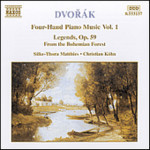
Four-Hand Piano Music, Vol. 1 (Incls 10 Legends, Op. 59, B 117)
 $25.00
Out of Stock
$25.00
Out of Stock6+ weeks add to cart
DVORAK
Four-Hand Piano Music, Vol. 1 (Incls 10 Legends, Op. 59, B 117)
Christian Kohn (piano) Silke-Thora Matthies (piano)
[ Naxos / CD ]
Release Date: Monday 20 August 2007
This item is currently out of stock. It may take 6 or more weeks to obtain from when you place your order as this is a specialist product.
"...a lively and diverting coupling of short pieces by Dvorak for piano duet...a handy disc to have."
- Classic CD - Dec.96
In the 1860s Dvorak played Smetana's music. In the 1870s Smetana conducted Dvorak's. Between them the two men -the elder the spiritual protege of Liszt, the younger championed by Brahms - encapsulated the Czech nationalist movement of the nineteenth century. "In Smetana's operas and symphonic poems," considered the critic Max Graf fifty years ago, "the Vltava rushes, the forests of Bohemia rustle, peasants dance, the old kings march to their castle high above the river accompanied by mail-clad knights, water nymphs float like the fogs of moonlit evenings, Hussites sing their chorales. In Dvorak's music peasants dance around the maypole and old crones tell old tales... armories in the Czech nation's struggle for political independence" - a struggle only won in 1918, after Dvorak's death. "National music", Dvorak told Harper's Magazine in February 1895, "is not created out of nothing. It is discovered and clothed in new beauty, just as the myths and the legends of a people are brought to light and crystallised in undying verse by the master poets. All that is needed is a delicate ear, a retentive memory, and the power to weld the fragments of former ages together in one harmonious whole... The music of the people, sooner or later, will command attention and creep into the books of composers". "To Brahms," Alfred Einstein maintained in Music in the Romantic Era (1947), the peasant Dvorak, sometimes village butcher's apprentice, "must have seemed almost the ideal musician, which Brahms himself was prevented from becoming through his being too heavily burdened with the past... Dvorak took over the heritage of absolute music quite naively, and filled its forms with an elemental music of the freshest invention, the liveliest rhythm, the finest sense of sonority -it is the most full-blooded, direct music conceivable, without its becoming vulgar . He drew always from the sources of Slavic folk dance and folk song, much as Brahms had drawn from those of German; the only difference was that with Dvorak everything was childlike and fresh, whereas with Brahms there was always an overtone of yearning or mystical reverence".
Tracks:
10 Legends, Op. 59, B 117
From the Bohemian Forest, Op. 68, B 133



